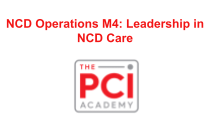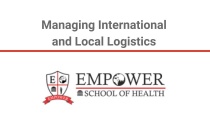The Birth: Labor, Delivery and Early Postpartum
GHM
This course is about The Birth: Labor, Delivery and Early Postpartum
NCD Operations M4: The Role of Screening
Primary Care International (PCI)
Screening and case finding are two important ways that people with NCDs can be identified early. We have seen in the earlier modules that it can take a few years before a patient with a NCD can become symptomatic. The sooner these patients are identified the earlier lifestyle changes can be made and treatment started. This l....
NCD Operations M4: Introduction to Monitoring and Evaluation
Primary Care International (PCI)
In this unit we will look at why we need to have monitoring and evaluation (M&E) systems in place for NCD care. We will look at what makes a good indicator and the differences between activity, process and outcome indicators. We will also outline how M&E is connected across different levels of the health system and the imp....
NCD Operations M4: The Role of Audit
Primary Care International (PCI)
In this unit you will think about how you can improve the quality of NCD services. You will look at the principles of quality improvement and focus on how audit can be one part of that process. You will look at an example of how an audit may be carried out for an area of NCD care and then apply these principles in your setti....
NCD Operations M4: Leadership in NCD Care
Mr WCEA Administrator
What makes a good leader? Do you want to improve your leadership skills? In this module you will learn about leadership in the context of NCD care
NCD Operations M4: Principles for developing care pathways
Primary Care International (PCI)
As you have seen in other modules, patients with NCDs will need to attend clinic regularly for monitoring and sometimes attend hospital. They will need examinations and investigations and changes in treatment depending on their results. They will also require patient education and lifestyle advice. A number of different team....
PCM M6: Sexual Dysfunction
Primary Care International (PCI)
This learning unit will cover common sexual dysfunction disorders in both males and females.
PCM M6: HIV
Primary Care International (PCI)
This learning unit will focus on human immunodeficiency virus (HIV). It may be helpful for you to have a pen and paper ready to take notes. The content in the module is based on guidelines and recommendations from national and international guidelines bodies such as the World Health Organization (WHO), National Institute for....
PCM M5 Newborn care and Immunisation
Primary Care International (PCI)
In this unit we'll explore how to support newborn health care.
PCM M5 Common Paediatric Problems
Primary Care International (PCI)
In this unit we'll look at some of the most common paediatric problems you are likely to encounter and how to deal with them.
Feeding and Abdominal Concerns
Dr Wendy Tyler, Mrs Susan Braid, Mrs Emma Morris and Dr Alan Fenton
This session describes the identification of a sick newborn presenting with alterations in feeding and/or bowel activity, stabilising baby in a community midwifery setting including the use of oro/nasogastric tube insertion, and transferring the baby to the Consultant Unit. This session was made possible through the support o....
Prematurity
Dr Wendy Tyler, Ms Jacqui Angell, Mrs Paula Pryce, Dr Alan Fenton
This session describes the stabilisation and transfer of a preterm baby delivered unexpectedly in a free-standing Midwifery Led Unit (MLU) or home birth setting. This session was made possible through the support of the Shrewsbury and Telford Hospital NHS Trust as part of a successful bid from Health Education England.
SRH
Primary Care International (PCI)
In this module, you will look at common topics in sexual and reproductive health from the primary care perspective. Sexual and Reproductive health is an important clinical area that can require discussing sensitive topics. As primary care clinicians, you need to be able to discuss all areas of sexual and reproductive health w....
Ethical Principles
Valerie Swigart, Douglas P. Olsen, Elizabeth G. Epstein, Ann Gallagher, Sharon D. Martin
3.75 Hours
This course describes the role of emotion in moral/ethical responses to provide a background for studying the bioethical principles. Scenarios from everyday life and clinical settings will be used to demonstrate the use of the bioethical principle framework inclusive of autonomy, nonmaleficence, beneficence and justice; and the....
Post-partum Haemorrhage
United Nations Population Fund and LSTM
To understand the contribution of obstetric haemorrhage to maternal mortality To understand how to identify post partum haemorrhage To update knowledge and skills in the prevention of PPH To update knowledge and skills in the treatment of PPH
Mass Media
Tciurban Health (The Challenge Initiative’s Knowledge Management Team at Johns Hopkins Center for Communication Programs)
Mass media refers to communication channels that can reach large audiences, such as radio, TV, newspapers, the Internet and billboards. When used effectively, mass media campaigns can generate considerable demand for family planning. This course provides participants with evidence to support the use of this approach but guidance....
Managing International and Local Logistics
Prof. Andy Barraclough
This includes understanding the need for formalized and fully documented Fast Track approach to Health Commodity procurement in pandemic situations, with special reference to the World Bank template and guiding documents for Healthcare Fast Track procurement. The different mechanism from the Global Agencies which are available....
Module 2 - Establish Client Understanding and Build Rapport Help the New Person
Johns Hopkins University Affiliate
These self-instructional modules will help you ensure that your clients understand what Oral PrEP is, what protection it can and cannot offer them, and how to initiate and continue to follow the indicated regimen. The modules include feedback and advice on sharing information and answering questions in a respectful and non-judgm....
Module 3 - Understanding Eligibility (Sorting)
Johns Hopkins University Affiliate
These self-instructional modules will help you build and strengthen your skills in helping your clients understand what oral PrEP is, what protection it can and cannot offer them, and how to initiate and continue to follow the indicated regimen. The modules include feedback and advice on sharing information and answering questio....
Diabetes in children
Judi Strong
This session will investigate the pathophysiology of diabetes mellitus and identify the symptoms of diabetes in children. Later, it will consider how to manage a child with undiagnosed diabetes and what measures to take in the event of a diabetic emergency.
Retinopathy of Prematurity: An overview lecture
Dr Iddi Ndyabawe and Dr Dan Bwonya
Discuss Retinopathy of Prematurity from its definition, its pathogenesis, how it is staged, how ROP is screened and how it is managed.
Community Pharmacy: Essential Services
Suraj Varia
This session provides details of the essential services offered by community pharmacies as part of the Community Pharmacy Contractual Framework (CPCF). It is part of the Pharmacy in Primary Care e-learning programme to support pre-registration community pharmacists.
























